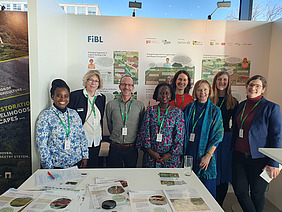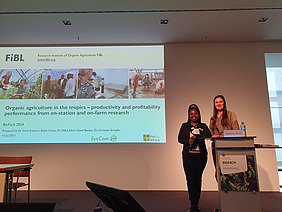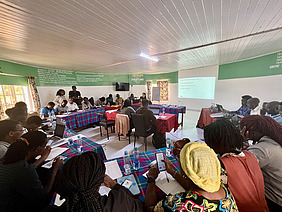The Knowledge Centre for Organic Agriculture and Agroecology in Africa (KCOA) project, funded by the Deutsche Gesellschaft für Internationale Zusammenarbeit (GIZ) GmbH , has become a cornerstone for sustainable agricultural development across the continent. As a key partner in this initiative, FiBL has contributed its expertise in organic farming systems to address critical challenges facing African agriculture, including climate change resilience, food security, and environmental conservation. Through collaborative efforts with local partners, representing West, East, Southern and Northern Africa as well as Cameroon/Central Africa, FiBL's work has helped transform how organic agricultural knowledge is identified, organised, validated, shared, and implemented throughout Africa's diverse farming communities. Here's a look at some of the achievements from the past four years.
Digital knowledge hub bridges research and practice
Between March 2020 and July 2024, FiBL played a pivotal role in developing the KCOA digital platform (kcoa-africa.org), organising knowledge products, like factsheets, videos, policy dossier, etc., along five dimensions: natural environment, production, processing, economic and social. This holistic framework has created a structured approach to organic agricultural knowledge in Africa.
The platform represents a significant achievement in transforming analogue knowledge to digital knowledge placed on a continental platform. Each resource undergoes validation by national and regional committees before publication, ensuring quality and relevance of the disseminated Knowledge Products.
Improved accessibility through digital innovation
Based on user feedback collected through surveys and workshops, FiBL revised the learning platform Organic Africa (www.organic-africa.net) to enhance accessibility. Key improvements include simplified navigation, revised layout, and an offline version of the whole website can be downloaded.
The team also conducted pilots for digital dissemination technologies in Senegal, Rwanda, Kenya, and Mali, testing various methods including SMS-based training, IVR-based training (Interactive Voice Response), and app-based training as well as offline digital tools.
Comprehensive training materials for organic farming
FiBL developed detailed training manuals covering critical aspects of organic agriculture, including:
- organic dairy and cattle farming
- vegetable production techniques
- organic chicken farming
These materials are available at the learning platform www.organic-africa.net in multiple formats – online, offline, and as downloadable PDFs – often accompanied by PowerPoint presentations for trainers.
Statistical data makes organic agriculture more visible
A significant contribution to the project was FiBL's compilation of the latest data on organic agriculture in Africa with collaboration from various stakeholders. The resulting Statistical Yearbook (2023) for Africa provides essential information for decision-makers, policymakers, and market actors, and other practitioners, highlighting that Africa has over 2 million hectares of organic farmland.
Integrating agroecology with organic agriculture
In 2023, FiBL successfully supported the project in the integration of agroecology concepts into KCOA, acknowledging the close relationship between organic farming and agroecological approaches. This work included clarifying the connections between different sustainable farming systems and developing materials relevant to both constituencies.
Policy impact through scientific evidence consolidation
FiBL translated organic and agroecological research findings into policy-relevant materials, producing a target policy brief, as well as a comprehensive policy dossier and factsheet based on 88 scientific publications. These documents demonstrate how agroecology and organic systems can contribute to sustainable development goals in the tropics, addressing productivity, income generation, climate resilience, and biodiversity conservation issues.
Next steps on the collaboration
In the next steps of this partnership, GIZ and FiBL alongside other KCOA partners across Africa, are working together in building and strengthening the connections and impacts of organic agriculture and agroecology actors and movement in the continent. This renewed collaboration promises important advancements in demonstrating clear pathways in which agroecology is a transformation road for food systems in Africa. It engages in promoting KCOA asset, materials and connections; contributes to the new developments of the KCOA network; and leverages on the achievements of the previous collaborations, especially when it comes to consolidating, collecting and disseminating evidence of agroecology impacts for advocacy work.
Further information
Contact
- Gian Nicolay, project coordinator
- Irene Kadzere, FiBL KCOA ambassador
Links and Downloads
- fibl.org: Project entry "KCOA" in the FiBL project database
- giz.de: Global project "Knowledge Centre for Organic Agriculture and Agroecology in Africa"
- kcoa-africa.org: KCOA - Knowledge Platform for Organic Agriculture and Agroecology in Africa
Training materials and publication
- organic-africa.net: Organic Africa website
- orgprints.org: All FiBL publications related to the KCOA project
- Factsheets at fibl.org
- youtube.com: KCOA educational video series
Statistics
- orgprints.org: Organic Agriculture in Africa. Statistical Yearbook 2023 (2021 data)
- statistics.fibl.org: Interactive online database with data on organic agriculture in Africa
- statistics.fibl.org: Interactive online infographics
- organic-world.net: Statistical yearbook on organic agriculture worldwide






